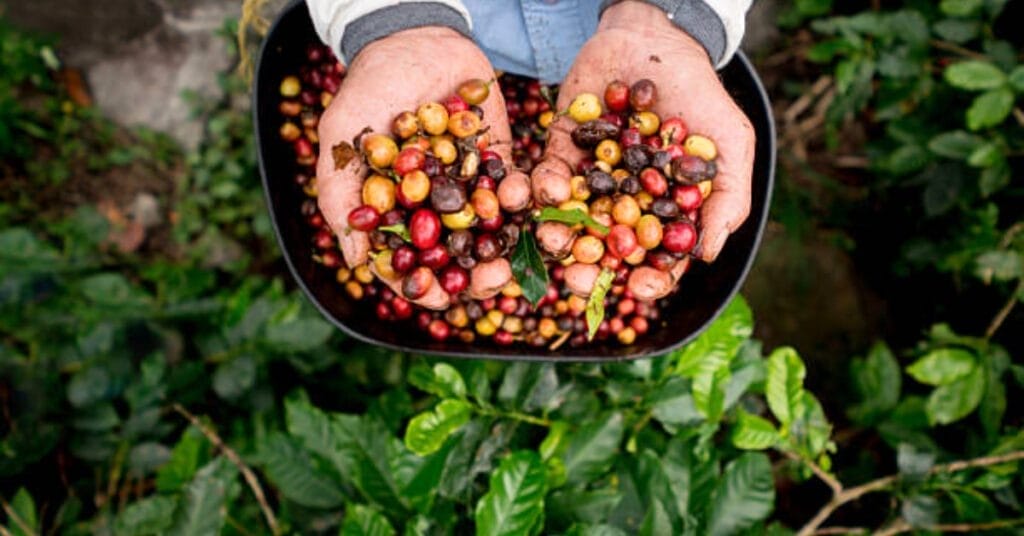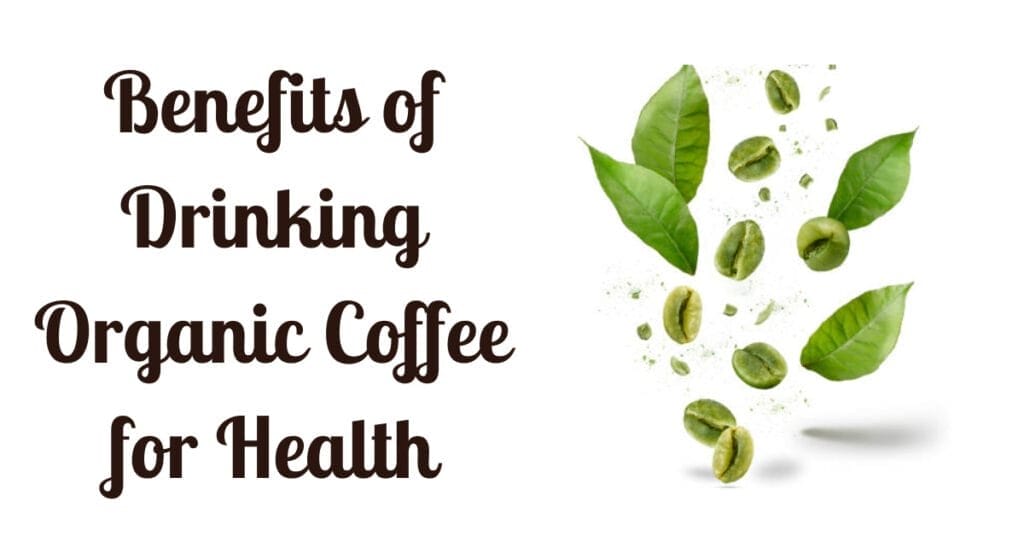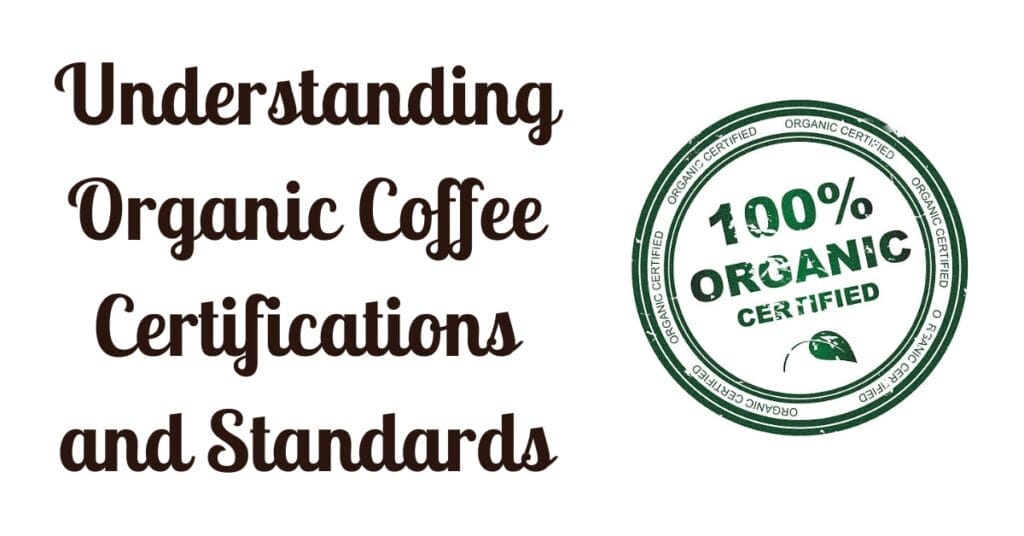What is organic coffee? It is an important question to be answered to understand the difference between organic and regular coffee beans.
Organic coffee, a term gaining prominence in the world of caffeine connoisseurs, refers to coffee produced without synthetic pesticides, herbicides, or genetically modified organisms.
The cultivation of organic coffee prioritizes environmentally friendly practices, fostering biodiversity and soil health.
Organic coffee vs regular coffee is a common debate among coffee lovers.
The key distinction lies in the adherence to stringent organic farming standards , ensuring that the coffee beans are grown harmoniously with nature.
This holistic approach extends beyond the cultivation process, encompassing ethical sourcing and fair trade practices.
The result is a cup of coffee that not only tantalizes the taste buds but also aligns with principles of sustainability and health.
Embraced by those seeking a more mindful and eco-conscious coffee experience, the popularity of organic coffee reflects a broader societal shift towards embracing products that prioritize both environmental and ethical considerations.
Explore the difference between organic coffee beans vs regular, natural coffee benefits, eco-friendly coffee farming techniques, is organic coffee better than regular coffee, and the purchasing power of organic coffee.
As an affiliate site, we are associated with the amazon. We might receive a commission when you use links or recommendations on our website to make qualified purchases. The cost you pay for the goods or services is unaffected by this.
Table of Contents
What Is Organic Coffee and How Is it Different: What Does The “Organic” Label Mean?

Organic vs regular coffee beans differ primarily in their cultivation methods.
Organic coffee beans have a rich history of rejecting synthetic pesticides and fertilizers.
In contrast, conventional or regular beans may be treated with synthetic chemicals to enhance growth and protect against pests.
The “Organic” label signifies a commitment to sustainable and environmentally friendly agricultural practices.
When a product, such as coffee, carries the “Organic” brand, it indicates that it has been produced without synthetic pesticides, herbicides, or genetically modified organisms.
Organic farming prioritizes natural processes, promoting soil health, biodiversity, and sustainable ecosystems.
Choosing products with the “Organic” label ensures a cleaner and healthier option and supports ethical coffee farming practices.
This designation is regulated by certification bodies, assuring consumers that the product meets stringent organic standards.
The Organic label goes beyond a marketing term; it represents a dedication to a more sustainable and conscientious approach to food and agriculture.
People often ask Is all Coffee Organic? Not all coffee is organic. “Organic” refers to a specific set of farming practices that prioritize sustainability and eschew synthetic pesticides, herbicides, and genetically modified organisms (GMOs).
Natural Coffee Benefits

Embracing the simplicity of natural coffee extends beyond its comforting aroma and rich flavor, offering a range of health benefits that make it a delightful addition to daily rituals.
Organic coffee beans do not necessarily lapse quickly like regular coffee beans, but their freshness can degrade over time.
Storage conditions, packaging, oxygen, light, and moisture influence the coffee beans’ shelf life. For example, some people store beans in a glass.
Proper storage in a cool, dark, and airtight container can help extend the freshness of both organic and regular coffee beans.
While some people believe that organic coffee is purer because it is produced without synthetic chemicals, the taste and purity are subjective and can vary from person to person.
Some individuals prefer the flavor profile of organic coffee, while others may not notice a significant difference.
Natural coffee retains its inherent goodness as a product of minimally processed coffee beans, providing a wholesome experience for enthusiasts.
Free from chemical residues, organic coffee is rich in antioxidants and can contribute to a cleaner, healthier brew, promoting overall well-being for coffee enthusiasts.
Here are some key advantages:
Antioxidant Powerhouse:
Natural coffee is replete with antioxidants, such as chlorogenic acid, which play a crucial role in neutralizing free radicals in the body.
These antioxidants contribute to overall health and are linked to a reduced risk of chronic diseases.
The presence of these compounds in natural coffee showcases its potential as a supportive element in maintaining a healthy and resilient body.
Boosts Mental Alertness:
The caffeine content in natural coffee is a natural stimulant, enhancing cognitive function and promoting alertness.
A moderate intake of natural coffee can improve mood, concentration, and reaction time.
This boost in mental alertness enhances productivity and adds a refreshing element to the coffee-drinking experience, making it an ideal companion for busy mornings or focused work sessions.
Supports Metabolism:
Coffee is known to stimulate the metabolic rate, aiding in the burning of calories.
This can benefit individuals looking to manage their weight or enhance their fitness routines.
The metabolic support provided by natural coffee aligns with a holistic approach to well-being, promoting both physical health and vitality.
Rich in Nutrients:
Natural coffee contains essential nutrients, including vitamins B2 (riboflavin), B3 (niacin), B5 (pantothenic acid), manganese, and potassium.
While these amounts may be relatively small, they contribute to overall nutritional intake.
These nutrients play diverse roles in bodily functions, from energy metabolism to antioxidant defense, underscoring the multifaceted dietary value of natural coffee.
Potential Long-Term Health Benefits:
Research suggests that regular consumption of natural coffee may be associated with a lower risk of certain diseases, including Parkinson’s, Alzheimer’s, and certain types of cancers.
The ongoing exploration of long-term health benefits adds an intriguing dimension to the appreciation of natural coffee, positioning it as a potential ally in preventive health strategies.
Mood Enhancement:
Beyond its physical benefits, natural coffee is known to have mood-enhancing properties.
The ritual of enjoying a cup can provide a sense of comfort and relaxation, contributing to overall well-being.
This emotional dimension adds depth to the coffee-drinking experience, making it a mindful and enjoyable ritual that transcends mere consumption.
Heart Health:
Some studies suggest that moderate coffee consumption positively impacts heart health, potentially lowering the risk of specific cardiovascular issues.
The cardiovascular benefits of natural coffee underscore its potential as a heart-friendly beverage, aligning with broader efforts to promote heart health through dietary choices.
Digestive Aid:
The natural compounds in coffee can stimulate stomach acid production, aiding digestion.
Recognizing coffee’s potential role as a digestive aid highlights its versatility and the varied ways it can contribute to overall digestive well-being.
While savoring natural coffee, it’s essential to be mindful of individual tolerance levels and preferences.
Moderation is vital to unlocking the full benefits, ensuring a delightful and health-conscious coffee experience beyond the cup.
Eco-Friendly Coffee Farming

Eco-friendly organic coffee farming represents a conscientious departure from conventional agricultural practices, prioritizing sustainability and environmental health.
At the heart of this approach lies a commitment to cultivating coffee beans without synthetic pesticides, herbicides, and genetically modified organisms (GMOs).
This deliberate choice ensures the production of cleaner, healthier coffee and safeguards the surrounding ecosystems.
One of the hallmarks of eco-friendly organic coffee farming is the use of natural fertilizers.
Instead of relying on chemical-based fertilizers, farmers opt for organic alternatives such as cattle manure or coffee pulp.
This not only enriches the soil but also minimizes the risk of harmful runoff into nearby water sources, contributing to the overall health of the surrounding environment.
Weed management in organic coffee farming takes on a natural and sustainable approach.
Techniques include using a natural gas flame weeder, allowing animals to graze on weeds, or manual removal by hand.
Organic coffee farming mitigates the potential environmental impact by eschewing chemical weed removal treatments.
It promotes a healthier balance within the ecosystem.
In organic coffee, the non-use of genetically modified organisms (GMOs) is a steadfast principle.
This ensures the preservation of biodiversity and prevents unintended consequences associated with genetic modification.
The commitment to maintaining the genetic integrity of coffee plants aligns with the broader ethos of organic farming, emphasizing a holistic approach to agriculture.
A distinctive feature of eco-friendly organic coffee farming is cultivating coffee plants in partial shade.
This intentional practice protects the plants from excessive sunlight, promoting healthier growth and serving as a bird habitat.
These avian inhabitants play a vital role in controlling pests that could otherwise threaten the well-being of the coffee plants.
The synergy between coffee cultivation and biodiversity exemplifies the interconnectedness inherent in sustainable farming practices.
Does Organic Coffee Taste Better?
Whether organic coffee tastes better is subjective and depends on individual preferences.
Various factors, including the coffee bean variety, growing conditions, roasting process, and brewing method influence the flavor profile of coffee.
While organic coffee is often praised for its environmental and health benefits, its taste is not universally agreed upon as superior.
Organic coffee enthusiasts argue that the absence of synthetic pesticides and chemicals in the cultivation process allows for a more nuanced and pure flavor.
However, taste preferences vary among consumers, and many factors contribute to the overall flavor experience.
Some people may appreciate the perceived smoothness and richness of organic coffee.
Ultimately, the taste of organic coffee is a personal preference, and individuals may need to explore various options to determine which type of coffee aligns best with their taste buds.
Whether organic or conventional coffee, factors such as bean quality, roast level, and brewing method play crucial roles in shaping the flavor of the final cup.
To preserve the freshness of organic coffee, store it in an airtight container in a cool, dark place. Avoid exposure to light, moisture, and air to maintain the beans’ robust flavors and aromatic qualities over time.
Is Organic Coffee Healthier?
Are organic coffee beans better? Organic coffee is often considered a healthier option compared to conventionally grown coffee due to the absence of synthetic pesticides, herbicides, and fertilizers in its cultivation.
Some studies suggest that organic coffee may have higher levels of certain antioxidants and beneficial compounds.
However, it’s important to note that the health benefits of coffee can vary based on individual preferences and sensitivities.
While choosing organic coffee can be a positive step for those concerned about environmental sustainability and potential chemical residues, moderation remains critical, as excessive coffee consumption may have adverse effects regardless of its organic status.
Nibbling coffee beans directly is rare, as they are ground and brewed to make coffee.
However, if you’re asking about eating coffee beans, they are safe to eat in moderation.
Some people enjoy chocolate-covered coffee beans or use them as a crunchy snack.
Does Organic Coffee have Caffeine?
Yes, organic coffee, like conventionally grown coffee, contains Caffeine.
Caffeine is a natural compound found in the seeds of coffee plants, commonly known as coffee beans.
The cultivation methods, whether organic or conventional, do not affect the inherent presence of Caffeine in the coffee beans.
The caffeine content can vary based on factors such as the coffee bean variety, growing conditions, and the brewing process. Generally, Arabica beans, often favored in organic coffee production, contain less Caffeine than Robusta beans.
The roasting process can also influence caffeine levels, with darker roasts having slightly less Caffeine than lighter roasts, despite the common misconception.
Consumers who are explicitly seeking lower-caffeine options may choose decaffeinated organic coffee.
Decaffeination processes typically use water, solvents, or carbon dioxide to remove most of the Caffeine while attempting to preserve the flavor compounds in the coffee beans.
Is Buying Organic Worth the Cost?
Whether buying organic coffee is worth the cost depends on individual priorities, values, and budget considerations.
Organic products, including food items like fruits, vegetables, and coffee, are typically more expensive than their conventionally grown counterparts.
When making this decision, it’s essential to consider personal values, such as supporting sustainable agriculture and minimizing exposure to pesticides.
Additionally, assessing the specific health and environmental concerns associated with particular foods can help individuals prioritize which products to buy organic.
Ultimately, striking a balance between personal values, budget constraints, and understanding the potential benefits of organic products can guide the decision on whether buying organic is worth the cost for an individual.

The Dangers of Non-Organic Coffee Beans

Conventional, nonorganic coffee beans pose potential risks to both human health and the environment due to the agricultural practices employed in their cultivation.
Here are some critical concerns associated with nonorganic coffee:
Chemical Residues:
One of the primary dangers of nonorganic coffee lies in using synthetic pesticides, herbicides, and fertilizers during cultivation.
These chemicals’ residue may persist on the coffee beans, potentially exposing consumers to harmful substances.
Long-term exposure to such residues has been associated with adverse health effects.
Impact on Human Health:
The consumption of nonorganic coffee may contribute to the ingestion of chemical residues present in the beans.
Some studies suggest a potential link between the intake of pesticides through conventionally grown foods, including coffee, and health issues such as disruptions in the endocrine system, neurodevelopmental problems, and an increased risk of certain cancers.
Environmental Concerns:
Using chemical fertilizers and pesticides in nonorganic coffee farming can lead to environmental pollution.
Runoff from fields treated with these chemicals may contaminate water sources, affecting aquatic ecosystems and potentially harming wildlife.
Additionally, the synthetic inputs contribute to soil degradation and reduced overall biodiversity.
Bitter Taste:
The cultivation practices in nonorganic coffee, including synthetic fertilizers, can impact the flavor profile of the beans.
Some consumers argue that nonorganic coffee tastes more bitter or harsh than organically grown varieties.
Contribution to Climate Change:
The conventional cultivation of nonorganic coffee often involves energy-intensive processes and may contribute to higher greenhouse gas emissions.
The reliance on chemical inputs and the energy-intensive nature of some traditional farming practices contribute to the carbon footprint associated with nonorganic coffee production.
In light of these concerns, individuals prioritizing environmental sustainability and personal health may opt for organic coffee.
Organic farming practices eliminate or significantly reduce the use of synthetic chemicals, fostering a more eco-friendly and health-conscious approach to coffee cultivation.
Understanding the potential dangers of nonorganic coffee beans allows consumers to make informed choices aligned with their values and well-being.
The Importance of Choosing High-Quality Coffee Beans
Choosing high-quality coffee beans is paramount to achieving a rich and satisfying coffee experience.
Among the myriad options available, some standout choices for medium roast include Ethiopian Yirgacheffe, known for its bright acidity and fruity notes, and Guatemalan Antigua, celebrated for its full body and chocolate undertones.
Lavazza Super Crema Espresso and Illy Classico Espresso beans are excellent choices for lovers of Italian-style coffee, delivering a well-balanced flavor profile with a touch of sweetness.
When it comes to cold brew, coarse and flavorful beans like Stone Street Coffee Cold Brew Reserve and Kicking Horse Coffee Smart Ass, blend exceptionally well, creating a smooth and robust cold brew experience.
Colombian java enthusiasts can indulge in the velvety richness of Volcanica Coffee Company’s Colombian Supremo or the complex flavors of Juan Valdez Colombian Coffee, showcasing the country’s renowned coffee heritage.
For those drawn to beans from Brazil, consider trying the nutty and chocolatey flavors of Coffee Bean Direct Brazilian Santos or the well-rounded sweetness of Koffee Kult Dark Roast Brazilian beans.
Ultimately, the key lies in selecting high-quality beans that align with your taste preferences to elevate your coffee ritual to new heights.
What Is Organic Coffee and How Is it Different: FAQS
What is the Safest Coffee?
Opt for Arabica dark roast for a low-caffeine option. At the same time, Blonde Robusta provides a more decisive kick for those seeking a more robust buzz.
What Chemicals are in Nonorganic Coffee?
Packed with synthetic fertilizers, pesticides, herbicides, fungicides, and insecticides, harming both the environment and those dwelling in it. Choose organic for a cleaner and more sustainable option.
Do Coffee Beans Need to be Organic?
While organic coffee is healthier, being free from harmful pesticides, herbicides, and fungicides, it’s worth noting that conventionally grown coffee is heavily treated with chemicals, making the organic option a preferable choice for health-conscious consumers.
Is Pure Coffee Organic?
Unlike other organic coffee brands, Purity Coffee® stands out as the global company dedicated to maximizing health benefits in every aspect of its production process, ensuring a uniquely pure and organic offering.
Bottom Line
In conclusion, organic coffee is a testament to a conscientious approach to cultivation, emphasizing environmental sustainability and ethical sourcing.
Understanding organic vs. conventional coffee is crucial for several reasons.
It allows consumers to make informed choices based on their values and concerns.
Awareness of organic vs. conventional coffee aids in comprehending potential health implications.
Understanding the query of whether organic coffee is better than regular coffee helps in supporting farmers and communities.







